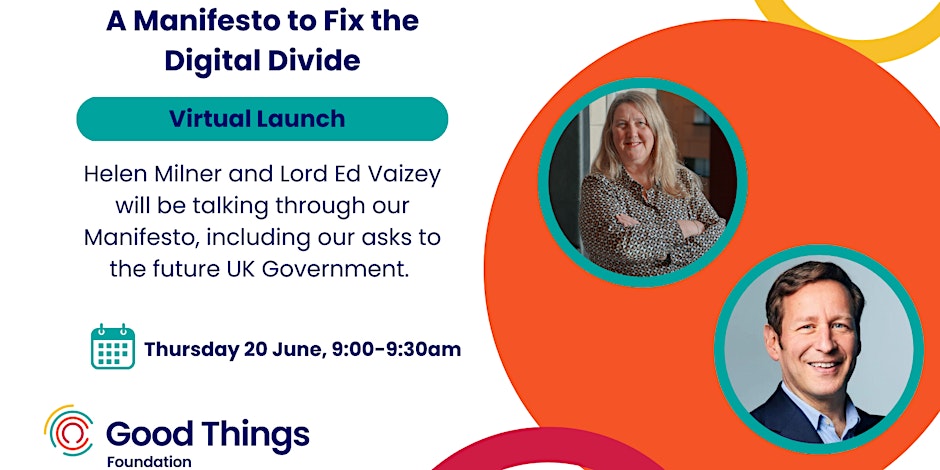National, local, collaborative approach for digital inclusion: a conversation with Mayor Andy Burnham
In our latest broadcast of Digital Futures for Good, Greater Manchester Mayor Andy Burnham emphasis the critical need for digital inclusivity - stating, “To be a true digital city region, you've got to be a place where everybody is connected, everybody is online, everybody is supported to be in the conversation.”
Digital inclusion needs a national, local, collaborative approach: a recap on Digital Futures For Good episode 3
The discussion with Mayor Andy Burnham, hosted by Good Things Foundation’s Group CEO Helen Milner, featured input from expert commentator Dana Haidan of Virgin Media O2.
How essential is connectivity?
Mayor Burnham highlighted that in today’s society digital connectivity is an essential, not just a desirable – something echoed by Haidan, who reflected on the need for digital access. Haidan remarked on the necessity of data and devices, as well as digital skills suitable for the AI age – and beyond the knowhow of using tech, the confidence of being online as well.
She said the Covid-19 pandemic and Virgin Media O2’s partnership with Good Things have underscored the importance of tackling the digital divide, especially as essential services increasingly digitise.
Addressing social policy
Mayor Burnham’s approach links various policy areas through a devolution lens, touching on the benefit system, housing, transport and digital infrastructure.
Haidan expanded on these themes, stating how “we have seen over and over again that digital exclusion is the one factor that makes social issues so much worse” and going on to address financial exclusion and the huge void appearing between those on and offline.
She stressed the need for secure digital financial services and the importance of ensuring everyone has access to these essential tools.
A national, local, collaborative approach
“We know that we alone cannot reach all the digitally excluded people in the UK and we’re gonna have to collaborate with the industry and also people from outside of our industry who can bring in really unique expertise and know how.”
Mayor Burnham’s bottom-up, localised approach led to a discussion about the National Digital Inclusion Network and the partnership it embodies with thousands of community based organisations delivering digital inclusion hubs.
Haidan argued for a national strategy implemented at a local level, pointing at examples such as the Shared Rural Network and GMCA’s social housing pilot as strong demonstrations of industry and Government working together.
First 100 Days
“You won’t succeed as a country if your individual citizens are not set up to succeed,” Mayor Burnham asserted, stressing the significance of establishing fundamental support systems across the society.
When asked what she would do in their first 100 days as Prime Minister to combat the digital divide, Haidan emphasised the need for digital rights and drawing on the Minimum Digital Living Standard in advocating for such benchmarks to be legally mandated. She went onto discuss tackling the digital divide head on at a Ministerial level – and joined-up and sustained Government leadership is something we’re also calling for.
Catch up on demand
You can watch the launch event of Helen’s conversation with Mayor Burnham and commentary from Dana here, along with the other episodes of Digital Futures for Good featuring Baroness Dido Harding and Baroness Anna Healy, Emma Revie and Martha Lane Fox.
A digital future - for good
As the UK approaches the upcoming General Election, the call for a concrete action plan to address digital exclusion becomes ever more urgent. Political parties are encouraged to consider the Good Things Foundation’s Manifesto to Fix the Digital Divide and tune into the Digital Futures for Good series to explore solutions for one of today’s most pressing issues.
Sign up here for our General Election special!
